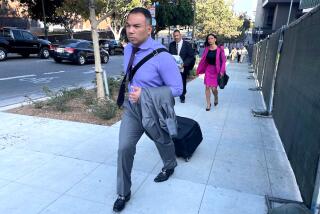Guilty Pleas Leave Lone Defendant in Roca Drug Trial
- Share via
Seven Bolivian nationals charged with running a major cocaine trafficking conspiracy have pleaded guilty to drug or money laundering counts in the case, leaving only the alleged ringleader to face a federal trial next week, authorities said Wednesday.
“We’re down to one,” Assistant U.S. Atty. John F. Gibbons said after U.S. District Judge Stephen V. Wilson accepted the last of the guilty pleas Wednesday. The plea was made by Beatriz Roca, whose brother, Jorge Roca Suarez, is charged with heading one of Bolivia’s largest cocaine cartels.
During Wednesday’s court session, Beatriz Roca told Wilson that she had taken direction from her brother and had laundered drug money for him and others.
She sat nervously through the session, answering most of Wilson’s questions in a barely audible voice. When she stood up to leave at the end of the session, she stumbled and passed out, falling to the floor of the courtroom.
Under the terms of her plea agreement, Beatriz Roca faces a 15-year prison sentence, though she could be paroled sooner. She told the judge that she understood the possible sentence and asked only that she be allowed time “so that I may arrange the situation of my children before I surrender.”
Wilson granted that request and set sentencing for Jan. 25.
Meanwhile, the trial is scheduled to begin next week for the lone remaining defendant, Jorge Roca, whose uncle was Bolivian minister of the interior. Roca, 40, faces drug and money laundering charges that could put him in prison for the rest of his life.
His lawyer, Yolanda Barrera, said she did not believe the guilty pleas by Roca’s relatives would hurt the case and said in some ways they could even help by reducing the trial to a single defendant and not distracting jurors with his wife and sisters.
“I was concerned, if you accept the government’s case, that the jury might see these women and punish him for involving them,” Barrera said.
Barrera said she had understood that the defendants who pleaded guilty would not implicate Jorge Roca and acknowledged that she was surprised to learn that Beatriz Roca had told the court she worked for her brother.
In a statement accompanying her plea, and in response to questions from Wilson, Beatriz Roca admitted that she participated in the collection, transportation and shipment of drug money at the direction of Jorge Roca and others. Beatriz Roca also said she knew at the time that the money was earned through drug sales.
That statement will not be admissible during her brother’s trial, and although Beatriz Roca could be called as a witness, her account would be subject to challenge on cross-examination by Barrera.
“You just hope that a jury will come in and be a blank slate,” Barrera said. “That’s all you can hope for.”
Among the other defendants who have admitted their participation in the narcotics conspiracy are Roca’s wife and other sisters, including Asunta Roca, who prosecutors say is the first person to be extradited from Bolivia to the United States.
Under the terms of her plea agreement, Asunta Roca will be sentenced to 10 years in federal prison for her participation in the cocaine conspiracy--which authorities say was responsible for shipping tons of the drug to Colombia and the United States and for laundering of millions of dollars in drug money.
Asunta Roca’s conviction was considered an especially high priority by American and Bolivian authorities who wanted to show that Bolivians who refuse to turn themselves in for drug crimes would face extradition and punishment in U.S. prisons.
“That country is watching her with keen interest to see that the system can work,” Gibbons said.
The guilty pleas filed this week come on the heels of a last-ditch attempt to derail the case a month ago. Barrera had asked Wilson to dismiss the indictment against all the defendants because many Bolivians said in sworn declarations that they had been tortured by Drug Enforcement Administration agents during the investigation of Jorge Roca.
Those allegations were presented to Wilson during a special hearing Oct. 26, but Wilson viewed them skeptically and noted that they did not bear on the charges against the defendants. He refused to dismiss the case and ordered the defendants to be ready for trial next week.
With that last option foreclosed, the defendants negotiated plea agreements rather than face a trial.
Barrera said that she spoke with Jorge Roca on Wednesday and that he was in good spirits and eager to have the case finally go to trial.
More to Read
Sign up for Essential California
The most important California stories and recommendations in your inbox every morning.
You may occasionally receive promotional content from the Los Angeles Times.











